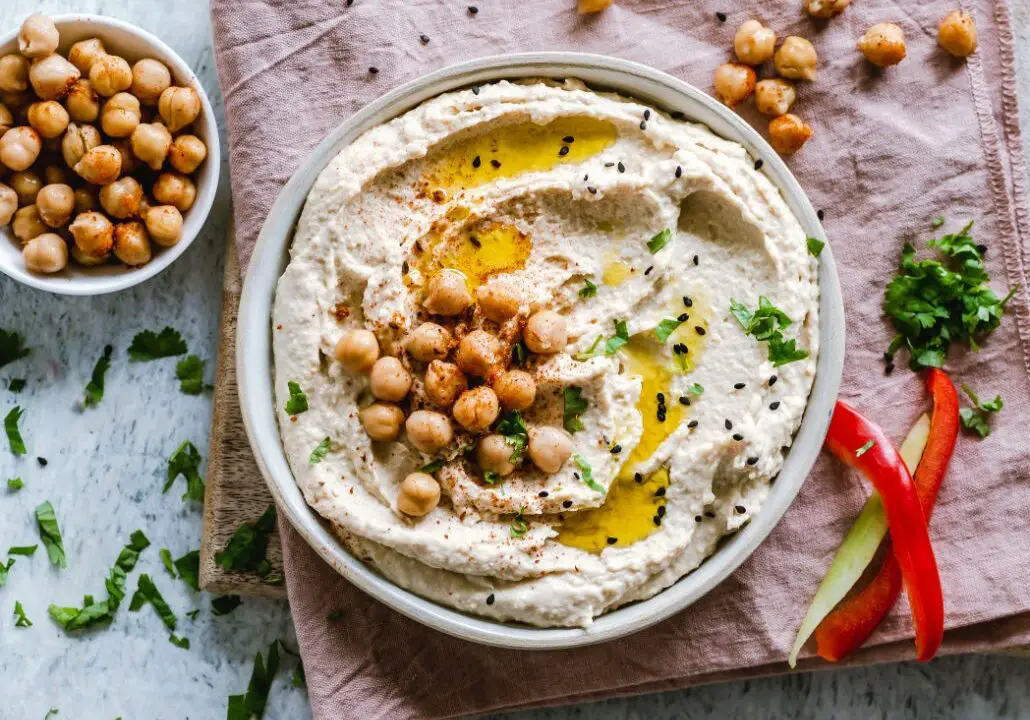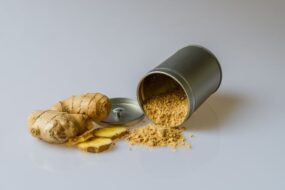
Are you looking for a healthy and delicious dip to help you lose weight? Look no further than hummus! This creamy spread made from chickpeas, olive oil, and ground sesame seeds is packed with nutritional benefits and is an excellent addition to a healthy diet. In this article, we’ll explore what to eat with hummus for weight loss and highlight some of the many health benefits of this tasty dip.
Table of Contents (click to expand)
Health Benefits of Hummus
Hummus sweet hummus is an excellent source of plant-based protein and heart-healthy fats. It’s also rich in dietary fiber, which helps keep you feeling full and satisfied. Eating hummus has been linked to a lower body mass index (BMI) and may help promote overall health by reducing chronic inflammation and promoting good gut bacteria. In addition to its nutritional value, hummus is incredibly versatile and delicious. Traditionally enjoyed in Middle Eastern cuisine, hummus has become a famous dip worldwide. You can find it in most grocery stores and even make delicious hummus at home!
Related: How Long Does it Take to Lose Weight When Lifting Weights?
Eating Hummus for Weight Loss
Incorporating hummus into your diet is an excellent idea if you want to lose weight. Hummus is a low glycemic index food that won’t spike your blood sugar levels like white bread or other high-carbohydrate foods. Additionally, because it’s a plant-based diet rich in protein, it can help keep you full and satisfied, helping you avoid overeating. In a study published in the journal Nutrients, researchers found that people who eat hummus regularly tend to have healthier diets overall. They also say avocado hummus tends to consume more nutrients and fewer harmful substances, such as saturated fat and added sugars.
A Closer Look: Health Benefits of Hummus Ingredients
Hummus, a traditional Middle Eastern dip or spread, is made from simple yet nutrient-packed ingredients. Each component adds not only to the creamy texture of the taste but also contributes to the overall health benefits of hummus. Let’s examine the key ingredients and their respective health benefits.
Chickpeas: The Powerhouse of Nutrients
Chickpeas, the primary ingredient in hummus, are a type of legume known for their high nutrient content. They are an excellent source of plant-based protein, making them a perfect option for vegetarians and vegans. Chickpeas are also packed with dietary fiber, which aids digestion and promotes a feeling of fullness, thereby contributing to weight management.
Furthermore, chickpeas are rich in vitamins and minerals, particularly B vitamins such as folate, essential for energy metabolism and nervous system function. Some studies suggest that regular consumption of chickpeas may reduce the risk of certain health conditions like heart disease and colon cancer.
Olive Oil: Heart-Healthy Fat
Olive oil, another staple ingredient in hummus, is a rich source of monounsaturated fats. These fats are considered healthy dietary fats that can help reduce inflammation, improve cholesterol levels, and enhance heart health. Olive oil is a core component of the Mediterranean diet, widely recognized for its potential health benefits, including reduced heart disease and stroke risks.
Related: How to Make Cucumber Water for Weight Loss: A Refreshing Recipe for Health and Wellness
Sesame Seeds: For a Healthy Boost
Sesame seeds are ground into tahini, a key ingredient in traditional hummus. These tiny seeds are densely packed with nutrients. They are rich in healthy fats and a good protein source, contributing to hummus’s satiating quality. Additionally, sesame seeds contain various essential minerals, including calcium for bone health and magnesium for heart health and mood regulation.
Lemon Juice: A Splash of Vitamin C
Lemon juice is often added to hummus to balance the flavors and add a tangy twist. But its contributions go beyond taste. Lemons are rich in vitamin C, a powerful antioxidant that helps protect the body against free radicals, boosts the immune system, and supports skin health. Vitamin C also aids in the absorption of iron from plant foods, enhancing the nutritional value of hummus further when paired with iron-rich foods. Combining these ingredients in hummus delivers a powerful nutrient punch. Enjoying hummus as part of your regular diet can be a delicious way to incorporate various nutrients supporting various health aspects. Remember that while hummus is healthy, it’s also calorie-dense, so moderation is essential, particularly if you’re watching your calorie intake.
30 Healthy and Delicious Options for Eating Hummus
Now that we’ve explored the benefits of hummus losing weight, and its ingredients, let’s look at some creative ways to eat it! Here are 30 options for what to eat with hummus for weight loss:
Hummus and Vegetables
- Carrot sticks – Carrots are a great source of beta-carotene and other essential nutrients.
- Cucumber slices are low in calories and water content, making them an excellent weight-loss choice.
- Bell pepper strips – Bell peppers are a good source of vitamin C and other antioxidants.
- Cherry tomatoes – These bite-sized tomatoes are great for snacking and add flavor to your hummus.
- Sugar snap peas – These crunchy vegetables are low in calories and fiber, making them an excellent weight-loss choice.
- Celery sticks are another low-calorie vegetable that adds a great crunch to your hummus.
- Broccoli florets – Broccoli is rich in vitamin C and other antioxidants and adds a nice crunch to your hummus.
- Cauliflower florets – Like broccoli, cauliflower is an excellent source of nutrients and adds a nice texture to your hummus.
- Radish slices – Radishes are low in calories and high in fiber, making them an excellent choice for weight loss.
- Zucchini rounds – Zucchini is a low-calorie vegetable rich in nutrients and can be sliced into rounds for dipping.
Hummus and Fruit
- Apple slices – Apples are a good source of fiber and add a sweet flavor to your hummus.
- Pear slices – Pears are low in calories and high in fiber, making them an excellent choice for weight loss.
- Grapes – Grapes are a good source of vitamin C and other antioxidants.
- Melon cubes are low in calories and water content, making them an excellent weight-loss choice.
- Pineapple Chunks – Pineapple is a good source of vitamin C and other essential nutrients.
- Orange slices – Oranges are a great source of vitamin C and add a burst of citrus flavor to your hummus.
- Berries are low in calories and antioxidants, making them an excellent weight-loss choice.
- Mango slices – Mangos are a good source of vitamin C and other essential nutrients.
- Kiwi slices – Kiwis are low in calories and high in fiber, making them an excellent choice for weight loss.
- Banana slices – Bananas are a good source of fiber and potassium and add a sweet flavor to your hummus.
Related: How much weight can you lose in 2 months?
Hummus and Whole Grains
- Pita bread – Pita bread is a traditional hummus pairing and provides a nice crunch.
- Whole wheat crackers – Whole wheat crackers are a great source of whole grains and add a nice crunch to your hummus.
- Brown rice cakes are a low-calorie option that provides a nice crunch for your hummus.
- Quinoa salad – Quinoa is a great source of plant-based protein and adds a nice texture to your hummus.
- Whole grain toast – Toast is a great breakfast or snack option, providing a nice base for your hummus.
- Corn tortilla chips – Corn tortilla chips are a great option for dipping and add a nice crunch to your hummus.
- Whole wheat pita chips – Pita chips are a great option for dipping and provide a nice crunch.
- Brown rice sushi rolls – Sushi rolls made with brown rice are a great option for a healthy snack or meal.
- Whole wheat English muffin – English muffins are a great base for your hummus and can be toasted for added crunch.
- Whole wheat pretzel sticks – Pretzels are a great option for dipping and provide a nice crunch.
Homemade Hummus Recipe
If you’re interested in making your chocolate hummus here, it’s pretty easy! You’ll need the following ingredients:
- One can of cooked chickpeas (drained and rinsed)
- Two tablespoons of tahini
- One clove of garlic (minced)
- 1/4 cup of lemon juice
- 1/4 cup of olive oil
- 1/4 teaspoon of ground cumin
- Salt and pepper to taste
Combine all ingredients in a food processor and blend until smooth. If the mixture is too thick, add some water to thin it out. Serve your creamy hummus with your favorite dipping options!
Related: How to Use Black Seed for Weight Loss: Health Benefits and More
Conclusion
Hummus is a delicious and healthy dip that can be enjoyed in various ways. Whether you want to lose weight or incorporate more healthy foods into your diet, hummus is a great choice. Try experimenting with different dipping options and see what combinations you like best. With so many health benefits and delicious flavors to choose from, hummus is sure to become a staple in your diet
Frequently Asked Questions
Does Hummus Help Burn Belly Fat?
While hummus is a healthy and magical belly fat-burning food, it’s high in protein and fiber, which can contribute to weight loss, including belly fat reduction. These nutrients help you feel fuller for longer, reducing the likelihood of overeating. However, weight loss requires a balanced diet and regular physical activity.
What Healthy Snacks to Eat with Hummus?
Hummus pairs well with a variety of healthy snacks. You could make hummus delicious and try vegetables such as carrot sticks, cucumber slices, bell pepper strips, or cherry tomatoes. Whole-grain pita bread or whole-grain crackers are also great options for serving hummus. Even fruits like apple slices can make a tasty and healthy hummus pairing.
How Much Hummus Should You Eat for Weight Loss?
While hummus can be part of a healthy, weight-loss-friendly diet, portion control is essential as it’s pretty calorie-dense. A serving size is typically two tablespoons, and it’s advisable to stick to one or two servings per snack or meal, depending on your overall daily calorie needs.
What Can You Dip in Hummus on a Low-Carb Diet?
If you keep hummus healthy and follow a low-carb diet, opt for low-carb vegetables to dip in hummus. Cucumber, bell peppers, celery, broccoli, cauliflower, and radishes are options. Avoid high-carb dippers like bread or crackers.
Related: Do You Lose Weight When You Sweat?
Can I Eat Hummus While Trying to Lose Weight?
Yes, you can eat hummus while trying to lose weight. It’s high in protein and fiber, which can help keep you full and satisfied, making it a good choice for a weight-loss-friendly diet. However, keep an eye on portion sizes, as hummus is also high in calories.
Is Hummus Fattening or Healthy?
Hummus can be fattening and healthy, depending on how much you eat and what you eat it with. It’s made from chickpeas, tahini (sesame seed paste), olive oil, and spices, all healthy ingredients. However, it’s also high in calories and fat, so overeating it can contribute to weight gain. As with many foods, moderation is key.





































